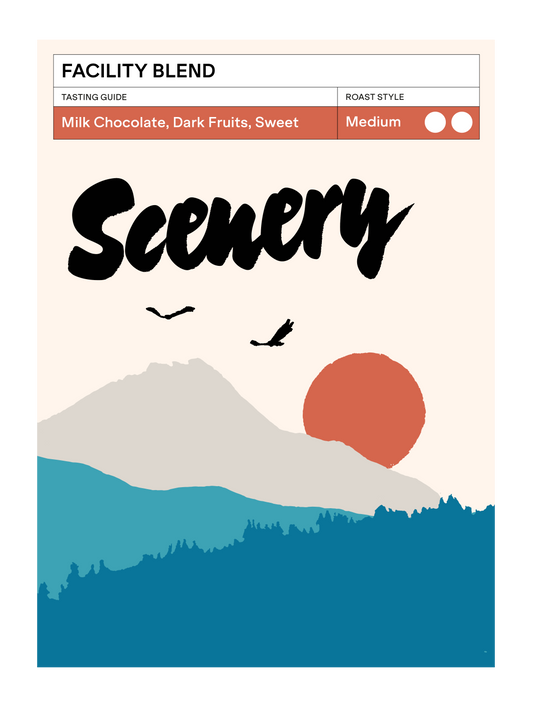This short run of bright, tealike washed bourbon from the Gikungere Hill smallholders ran from 24/04/24 to 12/06/24.
We launched Scenery less than a year ago with a lot from the smallholders of Giku hill as part of our opening offer. We’re thrilled to be already returning to the same producing group with a fresh harvest, this time with a fully washed lot.
Brew Guide:
A very well executed classic washed bourbon lot from the smallholders on Gikungere hill, we’re roasting this coffee light and bright to emphasise the citrus aromatics.
60g/L and 96-98c water for filter will do the trick
18g, 45g, 28-32s for espresso.
Best rested: 3 weeks from roast.
We’re tasting:
Aromatics that remind us of black tea with lemon and honey. In the cup a sweet & juicy red plum character as well as fizzy lemon sherbert, with a buttery weight. Some light and malty florals linger in the finish reminding us of first flush darjeeling tea.
Traceability:
Country of Origin: |
Burundi |
Region: |
Gikungere, Butaganzwa, Kayanza Province |
Farm: |
150 smallholder farmers selling cherry to Ninga CWS |
Station: |
Ninga CWS, Long Miles Coffee Project |
Variety: |
Red Bourbon |
Elevation: |
1600-1750 MASL |
Process: |
Washed: Ripe cherries picked and delivered on foot/bicycle to Ninga CWS. Cherries floated and skimmed to remove underripes. Pulped with initial density sorting before wet fermenting for 12-36 hours depending on temperature. Post ferment coffees washed using serpentine grading channels to sort by density whilst scrubbing mucilage. Dried for 1 day on shaded pre-drying tables with hand sorting to remove defects before being moved to raised beds |
Import Partner: |
Osito |
Harvest |
Crop 23/24, Arrived EU Dec 23 Second harvest purchasing coffee from Giku hill smallholders. |
The Story:
Burundi is a country that experiences a biennial crop cycle with its coffee production - that is to say, high production years followed by low, and so on. The majority of the smallholder farmers in Burundi tend relatively small numbers of trees, which makes it a struggle to lose production via pruning, stumping or re-planting. It is these older trees which are most prone to biennial production, as the energy required to produce a larger yield of cherries is paid for the following year, and climatic disruptions can only add to the effect as the older trees are less resilient.
The 2023 harvest was one such “off year” - Burundi saw significantly reduced yields across the country, with some regions reporting a drop in yields as low as 30% when compared to the average.
This is important for many reasons - on a macro scale, green coffee exports represent an important form of foreign currency flow for the Burundian state, and on a micro scale coffee is an important cash-crop for many farmers, with reduced yields representing a significant drop in income. Of microscopic import when compared to these, it also caused a scrabble as speciality buyers suddenly found themselves scrabbling to secure coffee from producers they maintain a purchasing relationship with. As a new roastery, a small fish in a big pond, we’re chuffed to have been able to secure a small allocation from the smallholders in Gikungere hill and the Ninga washing station to allow us to continue to represent their work and maintain a buying relationship. We were blown away by the quality of the lot #12 natural in our initial sourcing, so we hope to keep returning as part of our spring offer as the years continue.
Burundi and neighbouring Rwanda are important pillars in our sourcing strategy at Scenery. We love the profiles these countries produce - unique and varied regional expressions of the bourbon genetics these countries are known for.
It would be worth mentioning that when we talk about “red bourbon” as the variety making up these lots, we’re actually rather carelessly lumping a few bourbon lineage cultivars together alongside “classic” bourbon (that will have a certain landrace-esq local adaptation to the climate). Kent, Jackson, Mibirizi, Mayaguez are all bourbon cultivars commonly found in farms across these two countries, and their presence and genetic expression may go some way to explaining some of the regional differences for what is ostensibly a mono-culture.
We’ve made a point to source both classically processed (lower technical intervention) as well as value-add “experimental” lots as we think that both show the full dynamic range these countries are capable of producing.
Farmers will pick and deliver cherry to either collection points or to the washing stations themselves, depending on what is closer, although “closer” in this context can often still mean a matter of many kilometres - no small feat when a sack of fresh cherries could weigh 30-60kg and upwards. Cherry prices in Burundi are fixed by the government - in 2023 a kilo of ripe “cherry A” fetched 1280 Burundian francs, about 35p in today’s money. A station or collecting agent can pay no less but also no more - for the initial cherry collection, which is paid to the farmer on the spot at the moment of delivery. In order for the higher price commanded by speciality to return to the producers, a second “quality premium” will be paid - typically at the end of the harvest, some weeks or months later, as the coffee is being shipped and FOB invoices settled (payments made when coffee is loaded onto a container). This requires a lot of traceability, record keeping and sound-partnership to ensure that the value is fully returned for the higher premiums these lots command. But in terms of impact for your dollar, buying speciality coffee from countries like Rwanda and Burundi are pretty hard to beat. We’re fully on board with the on-the-ground work Long Miles does both in terms of farmer impact, as well as improving community livelihoods, and with the 2024 “up-cycle” crop looking set to provide increased volumes, we’re already looking forward to bringing back more coffee from the Giku smallholders and establishing one of our first long term buying partnerships at Scenery.

![[18] Burundi - Giku FW [CROP 23/24 ARCHIVE]](http://scenery.coffee/cdn/shop/articles/burundi_giku_FW_shopify_1.png?v=1720100312&width=1100)



![Colombia - El Jaragual Espresso [25/26]](http://scenery.coffee/cdn/shop/files/colombia_el_jaragual_espresso_2526_shopify.png?v=1752837490&width=533)


![Colombia - El Jaragual Caturra [25/26]](http://scenery.coffee/cdn/shop/files/colombia_el_jaragual_caturra_2526_shopify.png?v=1753431368&width=533)

![Kenya - Gatomboya AA [24/25]](http://scenery.coffee/cdn/shop/files/kenya_gatomboya_2425_shopify.png?v=1753431166&width=533)


![Guatemala - Familia Primavera [24/25]](http://scenery.coffee/cdn/shop/files/guatemala_familia_primavera_2425_shopify.png?v=1751223203&width=533)
